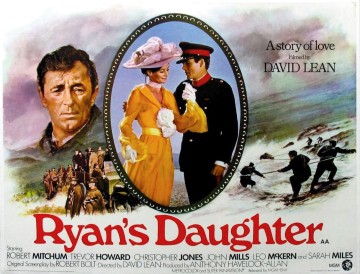Epic In Every Sense
- In the small town of Kinnery on the Dingle Peninsula in World War I era Ireland, a time of great tension and anti-British sentiment on the Emerald Isle, the young Rosy Ryan (Sarah Miles) spends her endlessly idle days inside her wild imagination. She is used to getting whatever she wants, having been spoiled rotten by her father throughout her entire life, and her most recent fancy is Charles Shaughnessy (Robert Mitchum), a middle-aged schoolteacher of whom Rosy has a schoolgirl crush on. But when she again gets what she wants and the two get married, the union is not all she hoped it would be. Not so much time passes when a new commanding British officer, the crippled and forever shell-shocked Randolph Doryan (Christopher Jones), is assigned to the town after a tour of duty in the Great War. Perhaps inevitably, Rose and Randolph have an impromptu run-in at the local pub and the two of them flare up a steamy backwoods romance. But how long can an affair between a married Irish woman and a high-ranking British soldier stay secret in a small and unforgiving town?
Drawing ever so slightly from Gustave Flaubert's famous novel Madame Bovary, the small-town story of Ryan's Daughter gets an epic, emotionally powerful and visually beautiful treatment from director David Lean (The Bridge On The River Kwai (1957), Lawrence Of Arabia (1962)) .
Despite being nominated for four Oscars (winning two of them), Ryan's Daughter was not well received by the public or the critics in its day. Oddly enough, Lean's epic style was one of the film's most frequently criticized elements; the idea behind the criticism being that Lean should not have taken a large-scale, epic approach to the clandestine, small-town story. This I do not understand.
Firstly, although the story is intimate and set in a small-town, the ideas it explores are very big. The emotions of love and nationalism that surge throughout Ryan's Daughter are powerful and absolutely fit Lean's epic execution. Secondly, the brilliance of the film's visuals does not overshadow the story or the characters. The film sets its story and characters inside a grand, visional splendid picture, yes, but they remain very much at the centerpiece of the film. The fact that Ryan's Daughter tells an intimate story in an epic fashion does not hurt the film at all.
Finally, the fact that the film was originally criticized for this epic, awe-inspiring look and feel is bizarre since the epic nature is one of the film's best features. The cinematography is absolutely gorgeous with many wide shots of the amazing Irish landscape, majestic fairytale-like imagery, and incredible scenes that are the cinematic equivalent to an out-of-body experience. The blending of Lean's big-picture style of storytelling and Freddie Young's exquisite cinematography - not forgetting Maurice Jarre's beautiful score - gives the harrowing story of Rosy Ryan's life a very unique feel that is strongly compelling as well as aesthetically pleasing.
Of course, while Ryan's Daughter has an incredible look, the characters and performances of those characters are incredible as well. Sarah Miles headlines a great cast, giving a terrific Oscar/Golden Globe/BAFTA Award-nominated performance as Rosy Ryan. Incredibly stunning in both beauty and characterization, Miles exudes forceful vulnerability, peculiarity, and charm into her character. In supporting roles, Christopher Jones keeps his majorly distraught Major Doryan character believable, subtle, and effective; Leo McKern is a marvelous loud-mouthed coward as Rosie's father; and Trevor Howard is wonderful as the wise old Father Collins, Rosy's good friend and the town's conscience.
John Mills' Michael the village idiot character, the only performance of the film that won an Oscar, is, interestingly enough, one of the film's less than fantastic aspects. Mills is not awful in the role; to his credit, Mills creates a sympathetic character in Michael and there are times you really do forget that Mills himself is actually not mentally challenged. However, it was a mistake to make the Michael character out to be the only person in the town who sees things as they really are; who truly understands what is really going on all the time. This aspect of the character really falls flat because Michael is portrayed by Mills to be rather abnormal and, well, dumb; so the character's supposed omniscience is nearly impossible to take seriously.
While most of the cast gives very memorable performances, Robert Mitchum's performance of Charles Shaughnessy is the most remarkable. This comes as no surprise since it is Robert Mitchum we are dealing with here, but what is surprising is just how good he is in a role that is so far removed from his iconic Hollywood tough guy persona. Few would have sought Mitchum out to play an Irish school teacher but Lean knew that Mitchum was perfect for the role. Wielding a great Irish accent as Charles Shaughnessy in Ryan's Daughter, Mitchum gives a scene-stealing intense yet calmly restrained performance as a highly intelligent, respectable, and affectionate ordinary townsperson. Mitchum gives a stunning performance that not only makes Charles a very interesting character to watch but highlights his own incredible range as an actor.
Despite the many awards wins and nominations, the financial and critical failure of Ryan's Daughter in 1970 caused director David Lean much stress and grief - in fact, he would not make another film until A Passage To India in 1984. While initially torn apart by critics upon its release, time has been good to Ryan's Daughter these many decades later. Cutting through the historical and critical baggage, Ryan's Daughter is a shimmering 1970s cinematic gem that is equal to, if not superior to, many of the other classic David Lean-directed films.
CBC Rating: 9/10

1 comment:
h9l44l3i81 v2p96n1c16 b8i06t6l74 b9n09b0d45 g3d75k8p22 l0k72e9v62
Post a Comment